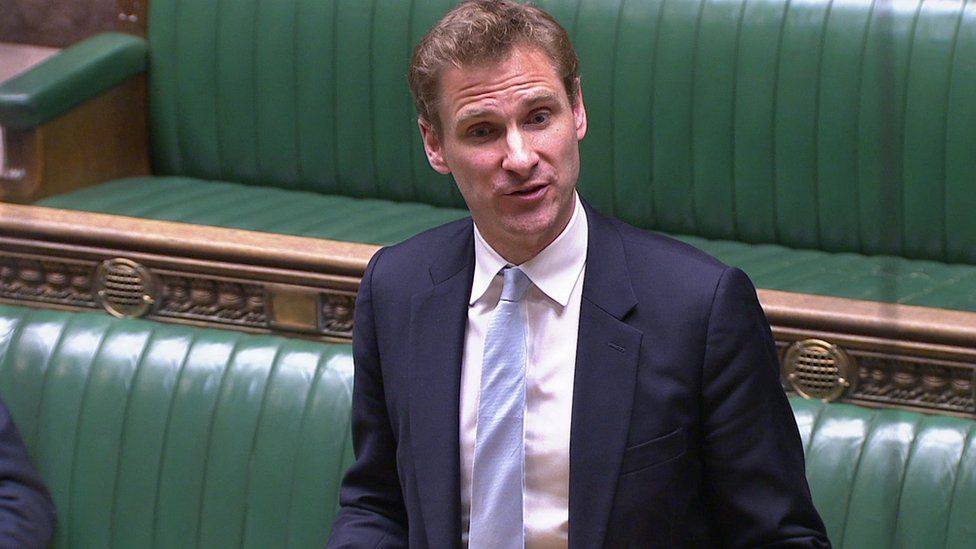ARTICLE AD BOX

Home Office minister Chris Philp defended existing rules on donations in the Commons
By Ben Wright
Political correspondent, BBC News
In the Commons, opposition MPs had lots of questions about Javad Marandi.
What access to government ministers - if any - did his financial support for the Tories secure? Are diligence checks for accepting donations strong enough? Would the Tory party be returning Mr Marandi's money?
Attempting to answer them was the Home Office minister Chris Philp, who told MPs that he had not heard of Mr Marandi until this morning and knew nothing about his donations to the Conservative party.
Mr Philp did, though, say there were stringent controls in place to ensure donations to political parties were legitimate and transparent.
The minister said all parties needed to be "careful" and "vigilant" about where donations come from but defended the safeguards in place, insisting the government was committed to making sure there was no "dirty money" in the UK.
Mr Marandi "vehemently denies any wrong doing", a statement issued by his representative said.
And his donations to the Conservative party have been transparently declared. Between 2014 and 2020, he gave £633,800 according to Electoral Commission records.
A Conservative Party spokesperson said in a statement the party only accepts donations from "permissible sources, namely individuals registered on the UK's electoral roll or UK registered companies. Donations are properly and transparently declared to the Electoral Commission, openly published by them, and comply fully with the law."
Questions about access
Mr Marandi is by no means the biggest donor to the Conservative party in recent years. But it again shines a light on the world of money and politics.
All political parties raise money through donations to fund their activities. It is legitimate and necessary. The vast bulk of Labour's donations come from trades unions while in recent years the Conservatives have relied heavily on the largesse of some very wealthy individuals.
But what about the answers to those questions in the Commons? How much access might donors such as Mr Marandi hope to get?
Image source, France 3
Image caption,Javad Marandi has donated more than £633,800 to the Conservative Party
This is not the first time Javad Marandi's name has cropped up in a story about Conservative party fund-raising.
In 2021, the Financial Times reported the existence of an "Advisory Board" for major party donors which was said to have regular meetings with the then Prime Minister Boris Johnson.
In February 2022 the Sunday Times reported Mr Marandi was a member of that select group, although a source close to the businessman told the newspaper at the time that he had only attended on one occasion.
This is a subject the Conservative party is very secretive about. It has never confirmed (or denied) the existence of any Advisory Board, nor how big a donation would qualify for membership.
I asked the Conservative Party if the Advisory Board still exists and how often it meets - as well as how many times Mr Marandi attended its meetings, and whether the party would publish details of its various tiers of donor clubs.
There used to be (and maybe still is) a leader's group which required a minimum donation of £50,000 a year to join. But in response to my questions the Conservative party said it does not publish details of donor events - and pointed out that Labour does not either.
A Labour source confirmed the party would not publish a list of who attended one of their fundraising dinners, for instance, at which senior figures might be present. The party also has a "rose network" for donors who give more than £1,000 a year. But Labour doesn't have a hierarchy of donor clubs for individuals that guarantee access.
Small change
As we head towards the next general election, all parties will be building up their war chests and their sources of cash will be under scrutiny.
The names of donors and their contributions will be published but far harder to quantify is the influence they may have.
While the sums Mr Marandi has given to the Conservative party might seem huge to most people, it is small change to a man of his wealth.
Mr Marandi also supports many charities and was made an OBE for his philanthropy.
Like several big donors I've talked to about this in the past, the cache of being a party funder and the social connections it brings might matter far more than any desire for influence.
Mr Marandi finds his own donations to the Conservative party being talked about because he lost a legal battle to remain anonymous over an international money-laundering case involving a business associate. No case has ever been brought against him or his businesses. He may feel a focus on his political activities is also deeply unfair.
But the story has again raised questions in parliament about donations, transparency and access.
"All political parties need to be very careful, thoughtful and discerning about where donations come from regardless of what the law may say," said the minister Mr Philp. "And that's a lesson political parties in this country need to reflect on very carefully and learn from."

 1 year ago
17
1 year ago
17








 English (US)
English (US)